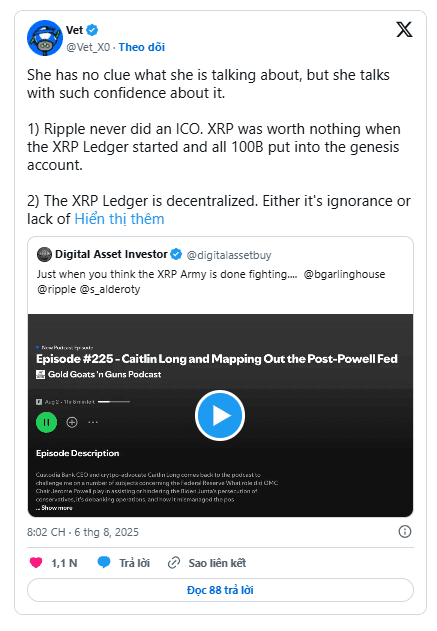David Schwartz, the Chief Technology Officer of Ripple, has publicly offered to clarify important information about Ripple, XRP, and the stablecoin RLUSD following criticism from Custodia Bank CEO Caitlin Long. The exchange began when Long criticized Ripple's direction in a podcast in early August 2025.
In her comments, Long asserted that tokens like Bitcoin and Ethereum are more suitable for decentralization than Ripple. She stated that these networks require less capital to deploy, in contrast to Ripple's distribution of XRP. Long also questioned why Ripple has not yet been able to replace traditional payment networks like SWIFT, despite existing for over 10 years.
Ripple, founded in 2012 and headquartered in San Francisco, focuses on cross-border payments using XRP, the company's native digital asset. The XRP Ledger (XRPL) is a decentralized blockchain that supports cryptocurrency and fast payments.
XRPL Validator Responds to Complaints About ICO and Centralization
Schwartz responded on August 7, stating that he is always willing to discuss this topic "whenever" Long wants to have a direct conversation about it. He also cited a detailed rebuttal from the well-known XRP Ledger validator, Vet (@Vet_X0).

Vet argues that Ripple has never conducted an initial coin offering (ICO). Instead, XRP had no value at launch, and the entire supply of 100 billion tokens was issued in the Genesis ledger account. He also dismisses claims that the XRP Ledger is centralized, noting that it operates over 1,000 nodes and 100 independent validators.
Vet confirms that RLUSD, Ripple's dollar-pegged stablecoin, is issued on both Ethereum and the XRP Ledger. He stated that Ripple continues to build its own decentralized infrastructure, including an internal decentralized exchange and ongoing feature upgrades. Schwartz concluded by inviting Long to discuss further to clarify misconceptions about Ripple's technology and roadmap.
